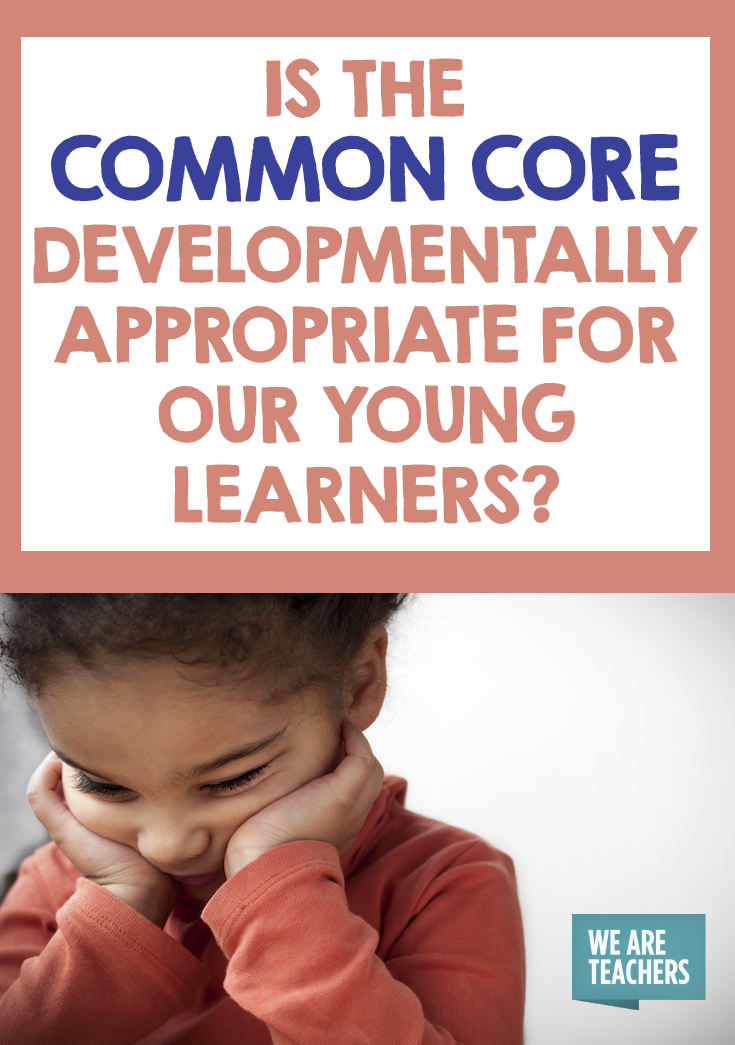Controversy has surrounded the Common Core State Standards ever since they launched in 2009. Many opponents argue that the standards are not developmentally appropriate, especially for young children. They worry that the standards create unrealistic expectations, especially for children from low-income families and English language learners, and interfere with children’s natural pace of learning.
Teachers report witnessing an increased amount of anxiety and a sense of failure in very young children, which, in many educators’ opinions, is a surefire recipe for disengagement and failure. In addition, the stressful assessment process in today’s curriculum may undermine children’s belief that school is a safe and nurturing place where they can engage in meaningful learning.
The loss of meaningful play-based early education
Retired early childhood teacher Karel Kilimnik describes her experience as a kindergarten teacher as an academic pressure cooker. “I was horrified at the expectations,” she says. “Instead of a play-oriented, hands-on, discovery approach, my students participated in relentless assessments. My blocks and easel disappeared, as did project time.”
In a Defending the Early Years (DEY) survey of about 200 early childhood teachers across 38 states, 85 percent of the public school teachers reported that they are required to teach activities that are not developmentally appropriate for their students. In fact, the pressure on teachers to implement standards that clash with their philosophy may be one of the top reasons why educators are choosing to leave the field.
One point of contention: the intense focus on early literacy skills
In the DEY report, Reading in Kindergarten: Little to Gain and Much to Lose, a New York public school kindergarten teacher with more than 15 years of experience is quoted as saying, “Kindergarten students are being forced to write words, sentences, and paragraphs before having a grasp of oral language … We are assessing them WEEKLY on how many sight words, letter sounds, and letter names they can identify. And we’re assessing the ‘neediest students’’ reading every other day.”
The report calls for a shift away from this form of tightly scripted, frequently assessed reading instruction. Instead, it advocates for a focus on child-directed activities (CDA). Advocates stress that child-created and -controlled play is at the heart of children’s learning. An “active play-based environment in which teachers intentionally design language and literacy experiences” is more than adequate to help prepare children to become fluent readers.
But some feel the standards are what students need
An article published by the American Federation of Teachers, Waiting Rarely Works: Late Bloomers Usually Just Wilt, disputes the theory of the “late bloomer” (or the developmental lag theory) and points to skills deficits, not developmental differences, as the cause for concern. “The main difference between the two theories,” the article states, “is that the developmental lag theory posited that difficulties in learning to read would fade as the brain matured—early, urgent intervention was not necessary. In contrast, the skill deficit theory claimed that waiting wouldn’t work; children wouldn’t pick up these skills unless taught directly and intensively. In fact, waiting would be harmful, as it condemned children to falling further behind.”
Working to change the situation
The key is finding developmentally appropriate methods to implement the standards, creating high-quality classrooms that balance accountability and standards (what children need to learn) with how children learn best. In a recent release from Education Roundtable, the experts point out that “the Common Core Standards define what all students are expected to know and be able to do, not how teachers should teach. For instance, the use of play with young children is not specified by the Standards, but it is welcome as a valuable activity in its own right and as a way to help students meet the expectations in this document.”
In the report Teacher Practices Related to Kindergarten Common Core State Standards for English Language Arts, the DOE agrees. “In kindergarten, teachers need to capitalize on the active and the social nature of kindergarteners and their instructional needs to include rich demonstrations, interactions, and models of literacy during projects and play activities that make sense to five- and six-year-old children.”
Many districts are revamping the Standards in ways that are in line with developmental appropriateness
The NAEYC supports decisions being resolved at the district and school levels and suggests that “local education leaders should not limit their curriculum to only the Common Core, but should build a curriculum to include standards that touch on other important domains of child learning and development.
As the standards continue to evolve, teachers, parents, and administrators must work together to ensure that all of our learners are being taught in the most effective manner—academically, culturally, and social-emotionally. We must prepare our students for the future while ensuring that we use appropriate and accessible methods for all.
Do you find the Common Core developmentally appropriate? Why or why not? Come and share in our WeAreTeachers HELPLINE group on Facebook.
Plus, what teachers really think about the Common Core.


